MY LIBERTARIAN POLICING PROGRAM
DISARM THE POLICE
LIKE COPPERS IN ENGLAND
REMOVE THE RIGHT TO PROTECT ONESELF BECAUSE YOU FEAR FOR YOUR LIFE FROM THE LAW, IN ALL JURISDICTIONS IN NORTH AMERICA IT IS AN EXCUSE FOR POLICE BRUTALITY AND MURDER
BAN USE OF TASERS AND PEPPER SPRAY, MACE, TEAR GAS
BAN BATON'S
BAN THE MILITARIZATION OF THE POLICE
BUILD COMMUNITY POLICING BASED ON SERVING THE PEOPLE NOT THE BOSSES OR THE STATE
END PROFILING
BASE COMMUNITY POLICING ON WORKING WITH NGOS, SOCIOLOGY DEPTS IN POST SECONDARY INSTITUTIONS, JUSTICE REFORM GROUPS, FIRST NATIONS, ETHNIC, RELIGIOUS OR MINORITIES OF CREED.
It’s possible that I shall make an ass of myself. But in that case one can always get out of it with a little dialectic. I have, of course, so worded my proposition as to be right either way (K.Marx, Letter to F.Engels on the Indian Mutiny)
Monday, June 01, 2020
Opinion: Systemic racism is the real 'American carnage'
A majority of white Americans still cannot come to terms with what black people have known forever: Racism is systemic, systematic, and nowhere near gone. White America must step up not just for peace, but for justice.
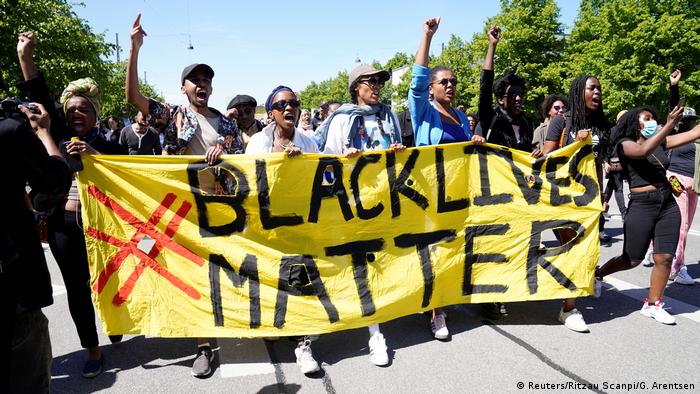
The images of burning police cars, clouds of tear gas, looted stores, law enforcement officers pushing civilians to the ground and protesters marching undeterred are startling and shocking for us Americans, but they are not surprising.
The video of an African American man dying on camera under the weight of a white police officer's knee on his neck is gruesome and shocking. It, too, is not surprising — we have seen videos like these before.
Echoes of the 2015 protests in Ferguson, Missouri, come to mind; for older generations, it is deja vu to the Rodney King riots of 1992 and lynchings during the civil rights movement.
But today's mass protests are gripping the nation at a time when a pandemic has claimed more than 100,000 lives, with more than 30 million unemployed, sky-high wage and income inequality and political polarization that is tearing the country apart.
It now feels like the US is reaching a breaking point. The future of the country seems bleak and uncertain. What we are seeing is "American carnage" — but not of the sort Donald Trump likely imagined when he strangely invoked that term at his presidential inauguration.
Racism doesn't take a break
While America went on lockdown due to the coronavirus pandemic, much of what characterizes normal life stopped. But the country's more fundamental and structural problems continued. Systemic racism is one of them, with numerous examples evident even as normal life came to a halt in recent months.
In February, video showed Ahmaud Arbery, a black man, being shot by two white vigilantes while out for a jog in Georgia.
In another video, a woman in New York's Central Park is seen calling the police on a black man who asked her to follow park rules and leash her dog, immediately telling them that "an African American man" was there and falsely claiming he was "threatening" her and the dog.
As the pandemic unfolded, people of color have suffered disproportionately high death rates from the coronavirus — also an indirect result of systemic inequality and racism. Yet armed white demonstrators occupied various state capitols to protest lockdown rules and shouted, intimidated and even spit at police officers, who handled them with the utmost care, in a glaring reminder that whites are treated differently by police.
Polarization blocks progress
Like nearly every topic in the US right now, the role of police and the criminal justice system are seen along political and racial lines. The 2015 Ferguson protests led to the creation of Black Lives Matter, a movement dedicated to increasing awareness of systemic racism and fighting the individual and collective biases that perpetuate it.
In response, countermovements popped up with the slogans "All Lives Matter," affirming the belief that Americans live in a colorblind society, and "Blue Lives Matter," promoting the view that police are heroes and have allegedly been framed for race-related violence.

DW reporter Jenipher Camino Gonzalez
It is no surprise that these movements have largely been supported by conservative-leaning whites. Polls have consistently shown that public trust for the police is higher among Republican voters, white and older people, while only a minority of Hispanics, African Americans, young people and Democrats share that trust.
In 2020, these opposing demographic, racial, and political lines are at their most antagonistic, fueling the country's ongoing fragmentation and tribalism.
These groups are actively kept apart by opportunistic political leaders like Trump, who actively stokes discord and whose place in the White House is a direct result of this high polarization and its resulting culture wars.
In such a deadlock, progress is blocked, and US streets will remain susceptible to bouts of violence.
White complacency must end
Statistics show it, studies expand on it and videos like those of George Floyd's killing crystallize it: African Americans are disproportionately targeted by police. Still, many white Americans cannot admit that the country's criminal justice system and police culture protect and benefit them.
Many white Americans cannot admit that racism remains an inherent societal problem and state structures are in dire need of reform to achieve equal treatment for the citizens they purport to serve. This inability of so much of white America to come to terms with its own privilege and empathize with minorities' experiences is the single largest roadblock to progress and reconciliation.
Those who are part of the problem must be part of the solution. People of color cannot single-handedly change a system that is inherently skewed against them; nor should they be forced to try. Throughout history, black mobilization has required a critical mass of white people joining the fight to tip the balance toward progress — during the abolitionist movement, the black suffrage movement, the civil rights movement.
The same is true today — but at a time when political tribalism reigns, can this happen once again? The challenge has never been so great and the stakes so high. If there is to be progress toward eliminating prejudice and racial violence, white Americans must stop being complacent about systemic racism.
IN PICTURES: US PROTESTS OVER GEORGE FLOYD, POLICE KILLINGS RAGE IN DOZENS OF CITIES
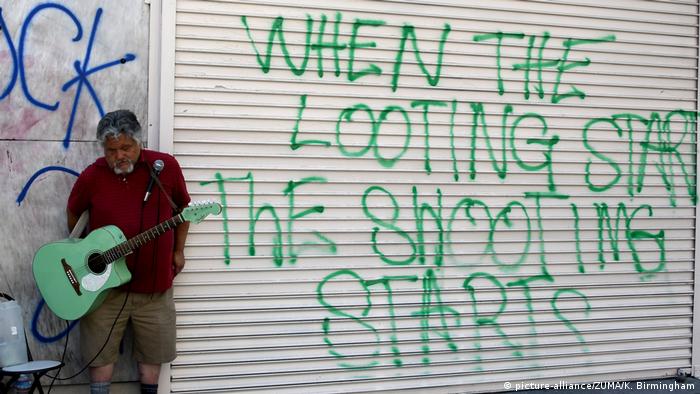
When the looting starts…'
President Donald Trump has threatened to send in the military to quell the protests, saying his "administration will stop mob violence and will stop it cold." Trump's response has inflamed tensions across the country. He blamed the rioting on alleged far-left groups, but Minnesota Governor Tim Walz told reporters he had heard multiple unconfirmed reports of white supremacists stoking the violence. 123456789
DW RECOMMENDS
Opinion: George Floyd killing opens racism wounds for European blacks
"There's no relief for me that I live in Germany," writes DW's Chiponda Chimbelu, as he reflects on the European reaction to the killing of George Floyd. It's a moment for Europe to reflect on its own racism, he adds. (01.06.2020)
Opinion: Athletes deserve freedom of expression
A handful of Bundesliga players signaled support for the fight against racism after the killing of George Floyd. DW's Jonathan Harding says they have every right to do so — and now is the time to offer support. (31.05.2020)
George Floyd killing: US cities deploy National Guard to quell riots
Protests, some violent, have escalated across the United States with people angry at the killing in police custody of unarmed black man George Floyd. Authorities in Minneapolis have vowed a stronger police presence. (30.05.2020)
AUDIOS AND VIDEOS ON THE TOPIC
From Ferguson, Missouri to Minneapolis, Minnesota
Date 31.05.2020
Author Jenipher Camino Gonzalez
Related Subjects The United Nations Children's Fund (UNICEF), Human Rights
Keywords USA, racism, George Floyd, police violence, human rights
From Ferguson, Missouri to Minneapolis, Minnesota
Date 31.05.2020
Author Jenipher Camino Gonzalez
Related Subjects The United Nations Children's Fund (UNICEF), Human Rights
Keywords USA, racism, George Floyd, police violence, human rights
Permalink https://p.dw.com/p/3d4rE
African Americans face deadly endemic police violence in US
The killing of George Floyd has triggered nationwide protests in the US. But they also reflect larger frustrations with policing and the disproportionate number of African Americans killed by officers.
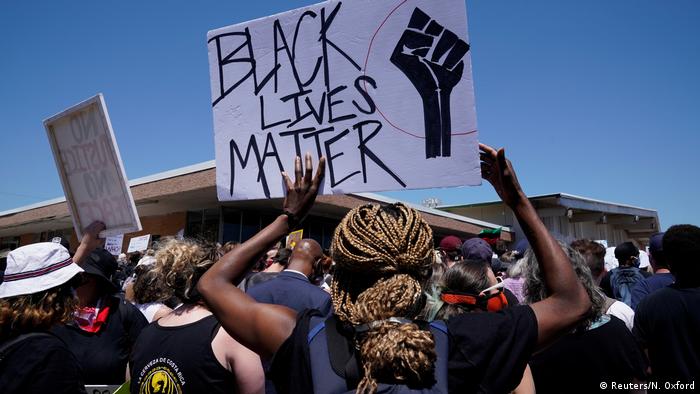
Since the killing of George Floyd in police custody last Monday, protesters have taken to the streets of numerous cities in the United States. They are angry, and they are demanding justice — and not just for Floyd's death alone, as the signs they hold make clear. The words they bear, "Black Lives Matter" and "I can't breathe," symbolize a much deeper frustration with police brutality and a desire for demand systematic change to policing, especially towards minorities, in the US.
What are the statistics on police-related deaths in the US?
The advocacy website Fatal Encountersdocuments deaths involving police officers going back to the year 2000. It currently crowdsources its data using 15 different Google Alerts to gather information on police-related deaths and is considered one of the most reliable datasources in the US on the issue.
As of May 27, the website's total number of records stood at 28,139, with the total for 2020 to date at 802. This number is high. By June 1, it had risen to 854.
"We're getting significantly more people killed in police encounters this year," the website's founder, Brian Burghart, told DW. "It's on track to be 1,978 [by the end of 2020] and our next highest number was in 2018 and that was 1,854."
In fact, Fatal Encounter's database shows that up to May 30, not a single day has gone by this year without a police-related death occuring. It also shows that African Americans are overly represented in those deaths since data collection began.
"You'll find that African Americans are killed at roughly double their ratio in the population," Burghart said. "They are about 13% [of the general US population] and they are about 26% represented in the data."
Of the 28,139 total records, African Americans made up 7,612. They are also significantly overrepresented in some categories of death, including "asphyxiated/restrained," "medical event" and "beaten/bludgeoned with an instrument."
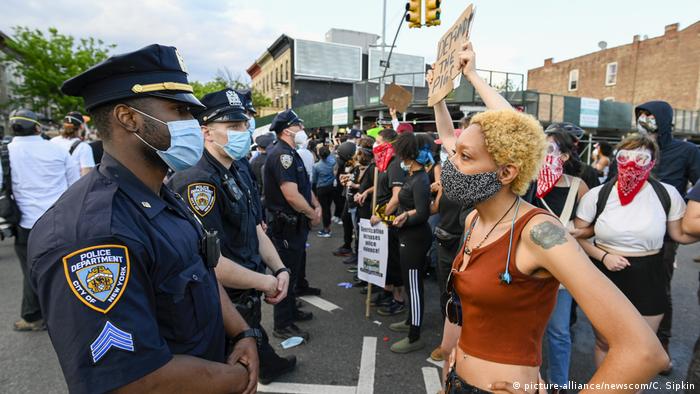
IN PICTURES: US PROTESTS OVER GEORGE FLOYD, POLICE KILLINGS RAGE IN DOZENS OF CITIES
'I can't breathe'
Tense protests over decades of police brutality against black people have quickly spread from Minneapolis to cities across the US. The protests began in the Midwestern city earlier this week, after a police officer handcuffed and pressed a knee on the neck of George Floyd, a 46-year-old black man, until he stopped breathing and died. 123456789
Which other deaths involving police officers have sparked widespread protest?
2014 was a watershed year for protests against police-related deaths across the US. In particular, the deaths of African Americans Eric Garner and Michael Brown sparked nationwide outcries about the actions of primarily white police officers.
In July of that year, Eric Garner was arrested by a New York City police officer on suspicion of illegally selling single cigarettes on Staten Island. During the arrest the officer, Daniel Pantaleo, put Garner in a chokehold, with an arm around his neck.
In video footage of the arrest, not dissimilar to that of George Floyd, Garner tells the officer "I can't breathe" 11 times before losing consciousness. He was pronounced dead at the hospital an hour later. His last words, a final repetition of "I can't breathe," became a rallying cry for protesters. It continues to be used to this day, including by those demonstrating today, as Floyd uttered the same words before dying.
The following month, Michael Brown was shot six times in Ferguson, Missouri, by officer Darren Wilson, sparking citywide unrest. People marching through the streets used the slogan "Hands Up, Don't Shoot," implying that Brown — who raised his hands before being shot, according to some witness accounts — and protesters themselves were no threat to officers and should not be targeted.
Another high-profile police-related death took place this past March. Breonna Taylor, a medical worker in Louisville, Kentucky, was shot eight times by plainclothes police who broke into her apartment using a "no-knock" warrant, which allows police to enter a property without announcing their presence or purpose. The police mistakenly believed a drug dealer had been receiving packages at her home. The incident stoked tension in Louisville and has also fed the current nationwide protests.
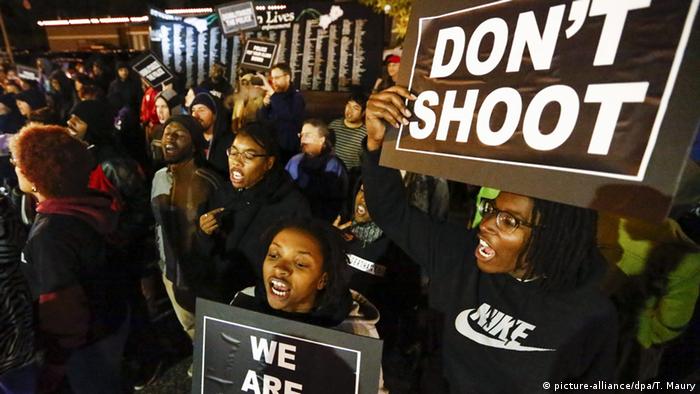
Michael Brown's killing in Ferguson, Missouri sparked mass protests in 2014
What has happened after these police-related deaths?
For many African Americans, the action taken after each death has been nowhere near enough. Eric Garner's mother, Gwen Carr, told CNNin an interview that seeing George Floyd's death was "just like the murder of my son all over again."
A medical examiner found Garner's death to be a homicide, but Pantaleo was never criminally indicted. He was fired from the police force in August 2019, five years after the killing.
Darren Wilson was also not charged in the death of Michael Brown. In fact, according to the project Mapping Police Violence, which uses Fatal Encounters as one of its sources, 99% of killings by police from 2013-2019 did not result in a charge.
In Louisville, Mayor Greg Fischer announced last week that no-knock warrants were being suspended in light of Taylor's death, but civil rights advocates have called for a permanent ban.
Derek Chauvin, the officer who knelt on George Floyd's neck, , has been charged with third-degree murder and second-degree manslaughter. The other three officers present at the time have been fired but face no charges for now.
But a conviction won't solve the underlying problems, according to Philip V. McHarris, a writer and doctoral candidate at Yale who focuses on race, housing and policing.
"It [a conviction] tries to focus on individual officers or incidents, as opposed to seeing things as a broader structural issue," he said in an interview with DW. "The focus on individual officers will not lead to police violence ending."
From Ferguson, Missouri to Minneapolis, Minnesota
What is needed to reduce police violence?
McHarris believes that officer training in de-escalation, sensitivity, correct procedure and wearing body cameras — all measures police forces take to try and reduce violence, especially towards minorities — are too narrow in focus, as they do not address systematic abuse and injustice. In an op-ed he co-wrote for The New York Times, he argues that the Minneapolis Police Department "is held up as model of progressive police reform," but that did not stop Floyd's death.
Instead of increased police presence and militarization, which is clearly visible in the response to the current nationwide protests, McHarris argues that less police intervention is needed and more efforts must be made to tackle underlying frustrations.
"As opposed to just trying to reform and give police forces more resources and more money, just avoid it altogether," McHarris told DW. "Redirect those funds from things focused on policing and punishment to other programs and initiatives that actually have the buy-in of the community."
"The reason George Floyd sparks is because it's part of a systemic trend where everybody can relate," he told DW. "For many black people it's the constant reminder that if that can happen to George Floyd, that can happen to me, and it's not abstract. They killed a man on camera as bystanders pleaded to intervene to no avail."
Every evening, DW sends out a selection of the day's news and features. Sign up here.
DW RECOMMENDS
Opinion: Systemic racism is the real 'American carnage'
A majority of white Americans still cannot come to terms with what black people have known forever: Racism is systemic, systematic, and nowhere near gone. White America must step up not just for peace, but for justice. (31.05.2020)
George Floyd protests: Trump, officials blame extremist 'outsiders' for violence
Both far-right and far-left groups have been blamed for violence at recent US anti-racism protests, with videos showing white people escalating tensions. Black protesters worry that they'll end up in the crossfire. (31.05.2020)
Date 01.06.2020
Author Alex Matthews
Keywords George Floyd, Black Lives Matter, Michael Brown, Eric Garner, police violence, US, Minneapolis, racism
Permalink https://p.dw.com/p/3d5rm
Munich bans use of Nazi 'Jewish star' at coronavirus protests
Anti-lockdown protesters in Germany have come under fire for appropriating the horrors of the Holocaust. Several have dressed up as concentration camp prisoners and put on Nazi-era stars reading: "unvaccinated."
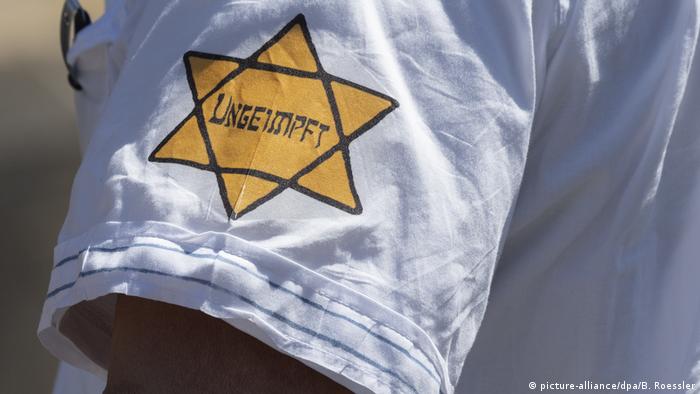
The city of Munich banned the use of Nazi-era Stars of David at coronavirus protests on Sunday after participants were seen wearing them in recent weeks.
Several protesters in cities across Germany have started wearing six pointed, yellow stars with the word "unvaccinated" emblazoned on them. From the color to the font, they're nearly identical to the badges Jewish people were forced to wear across Nazi-occupied territories during the Holocaust.
Read more: How are Germany's coronavirus protests different?
Other anti-lockdown protesters have also dressed up in striped prisoner uniforms — drawing comparison to concentration camp prisoners — and held up signs reading: "Masks will set you free" or "Vaccination will set you free."
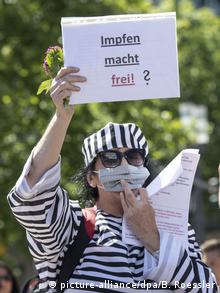
Protesters held signs reading "Vaccinations will set you free"
The slogans reference the "Arbeit macht frei" ("Work will set you free") signs that hung above several concentration camps, where millions of Jews were killed during the Holocaust.
Demonstrators are using the highly questionable protest tactics to voice their opposition to mandatory coronavirus vaccines — despite the fact that the German government has repeatedly said it will not implement such a program.
Read more: In Germany, vaccine fears spark conspiracy theories
Politicians slam anti-Semitic tactic
Felix Klein, Germany's commissioner for the fight against anti-Semitism, said that wearing the altered Jewish stars was a "calculated breaking of a taboo," reported local public broadcaster Bayerische Rundfunk.
The tactic has been used increasingly in protests in Germany, Klein said. In using symbols of the Holocaust to provoke at protests, he added, the demonstrators downplay the victims and their suffering.
Other politicians have called for more cities and states to also ban the use of Nazi-era stars at protests and to label them as a form of incitement.
Read more: Germany sees rise in anti-Semitic, political crimes
Rüdiger Erben, a Social Democrat lawmaker in the state parliament of Saxony-Anhalt, said that the symbols have also appeared at protests in his state and that they have nothing to do with freedom of speech or freedom of assembly.
Whoever puts on one of the stars is acting "as an anti-Semite of the most repulsive kind," Erben told news agency epd.
Protesters have been gathering for weeks in cities across Germany to demonstrate against the government's restrictions to stem the spread of COVID-19.
Although participant numbers are starting to dwindle, politicians and analysts have grown increasingly concerned about right-wing extremist radicalization at the demonstrations.
https://www.dw.com/en/munich-bans-use-of-nazi-jewish-star-at-coronavirus-protests/a-53644792
Pushing back against coronavirus scapegoating in Germany
rs/dr (dpa, epd)
Every evening at 1830 UTC, DW's editors send out a selection of the day's hard news and quality feature journalism. Sign up to receive it directly here.
Date 31.05.2020
Related Subjects Holocaust, World War II, Nazis, Germany, Munich, Coronavirus
Keywords Germany, coronavirus, protests, Holocaust, "Jewish stars", Nazis, Munich
Feedback: Send us your feedback.
Print Print this page
Permalink https://p.dw.com/p/3d5Sa
Anti-lockdown protesters in Germany have come under fire for appropriating the horrors of the Holocaust. Several have dressed up as concentration camp prisoners and put on Nazi-era stars reading: "unvaccinated."

The city of Munich banned the use of Nazi-era Stars of David at coronavirus protests on Sunday after participants were seen wearing them in recent weeks.
Several protesters in cities across Germany have started wearing six pointed, yellow stars with the word "unvaccinated" emblazoned on them. From the color to the font, they're nearly identical to the badges Jewish people were forced to wear across Nazi-occupied territories during the Holocaust.
Read more: How are Germany's coronavirus protests different?
Other anti-lockdown protesters have also dressed up in striped prisoner uniforms — drawing comparison to concentration camp prisoners — and held up signs reading: "Masks will set you free" or "Vaccination will set you free."

Protesters held signs reading "Vaccinations will set you free"
The slogans reference the "Arbeit macht frei" ("Work will set you free") signs that hung above several concentration camps, where millions of Jews were killed during the Holocaust.
Demonstrators are using the highly questionable protest tactics to voice their opposition to mandatory coronavirus vaccines — despite the fact that the German government has repeatedly said it will not implement such a program.
Read more: In Germany, vaccine fears spark conspiracy theories
Politicians slam anti-Semitic tactic
Felix Klein, Germany's commissioner for the fight against anti-Semitism, said that wearing the altered Jewish stars was a "calculated breaking of a taboo," reported local public broadcaster Bayerische Rundfunk.
The tactic has been used increasingly in protests in Germany, Klein said. In using symbols of the Holocaust to provoke at protests, he added, the demonstrators downplay the victims and their suffering.
Other politicians have called for more cities and states to also ban the use of Nazi-era stars at protests and to label them as a form of incitement.
Read more: Germany sees rise in anti-Semitic, political crimes
Rüdiger Erben, a Social Democrat lawmaker in the state parliament of Saxony-Anhalt, said that the symbols have also appeared at protests in his state and that they have nothing to do with freedom of speech or freedom of assembly.
Whoever puts on one of the stars is acting "as an anti-Semite of the most repulsive kind," Erben told news agency epd.
Protesters have been gathering for weeks in cities across Germany to demonstrate against the government's restrictions to stem the spread of COVID-19.
Although participant numbers are starting to dwindle, politicians and analysts have grown increasingly concerned about right-wing extremist radicalization at the demonstrations.
https://www.dw.com/en/munich-bans-use-of-nazi-jewish-star-at-coronavirus-protests/a-53644792
Pushing back against coronavirus scapegoating in Germany
rs/dr (dpa, epd)
Every evening at 1830 UTC, DW's editors send out a selection of the day's hard news and quality feature journalism. Sign up to receive it directly here.
Date 31.05.2020
Related Subjects Holocaust, World War II, Nazis, Germany, Munich, Coronavirus
Keywords Germany, coronavirus, protests, Holocaust, "Jewish stars", Nazis, Munich
Feedback: Send us your feedback.
Print Print this page
Permalink https://p.dw.com/p/3d5Sa
China Trolls U.S. Over Protests After Trump Criticized Hong Kong
Iain Marlow
(Bloomberg) -- Chinese officials and state media needled the Trump administration over race-related protests and looting that have engulfed U.S. cities in recent days, after weathering criticism and threats from Washington over Beijing’s own moves to quell unrest in Hong Kong.

Iain Marlow
(Bloomberg) -- Chinese officials and state media needled the Trump administration over race-related protests and looting that have engulfed U.S. cities in recent days, after weathering criticism and threats from Washington over Beijing’s own moves to quell unrest in Hong Kong.

© Getty Images via Bloomberg Protesters face off with police outside the White House on May 30.
China’s leaders recently moved to impose sweeping new national security legislation on the Asian financial hub following months of violent pro-democracy protests last year. The decision has alarmed foreign governments and prompted the U.S. to threaten retaliation, including Friday’s announcement that it would “begin the process” of eliminating the policy exemptions that allow America to treat Hong Kong differently than the mainland.
Yet as President Donald Trump expressed alarm about the “deeply troubling” situation in Hong Kong, he soon found himself facing similar scenes on the U.S.’s own streets. The U.S. is now struggling to contain widespread protests triggered by outrage over the death of George Floyd, an African-American man who died after a white police officer held him to the ground and pressed a knee into his neck for more than eight minutes.
Trump will meet on Monday with Attorney General William Barr at the White House, before convening a teleconference with governors, law enforcement and national security officials, the White House said late Sunday.
Over the weekend, China’s foreign ministry and state media seized the opportunity to fire back at Trump. Chinese propaganda outlets played up scenes from the U.S. of violence, burning buildings, harsh police responses and protesters decrying government as part of a broader narrative that western democracies are regularly plagued by chaos and unrest that would never be permitted in the mainland.
What Hong Kong Losing Its ‘Special Status’ Would Mean: QuickTake
Foreign ministry spokeswoman Hua Chunying retweeted U.S. State Department spokeswoman Morgan Ortagus -- who had urged people to stand against the Communist Party over its treatment of Hong Kong -- and added “I can’t breathe,” some of the last words uttered by Floyd before he died that have become a rallying cry.
Hua then tweeted a link to a video report on the U.S. violence with the words “THUGS & HEROES HYPOCRISY.” The tweet was a reference to double standards over the Hong Kong protesters, who received praise from U.S. lawmakers as China repeatedly condemned them for acts of vandalism, arson and throwing petrol bombs at police.
On Chinese mico-blogging platform Sina Weibo, video clips showing Minneapolis police shooting paint rounds at residents on their porch for violating a curfew went viral in the mainland after being posted by top state media outlets including the People’s Daily newspaper and the Global Times.
‘Double Standards’
By Monday morning, “U.S. National Guard firing into residents homes” was one of the top 10 search topics on the Twitter-like service, and the hashtag “U.S. riot” had a total of 1.36 billion views.
“U.S. politicians call riots in other countries ‘a beautiful sight,’ they ignite flames everywhere and wish the world to be in chaos,” state broadcaster CCTV said separately in a commentary Saturday. “But when the minority groups in their own country are fighting for legitimate rights, they cannot wait but to crackdown harshly. Such hypocritical double standards are truly disgusting.”
In a series of tweets, Hu Xijin, the editor of the Global Times, ridiculed Trump and other senior U.S. politicians for previously encouraging the protests in Hong Kong.
“I want to ask Speaker Pelosi and Secretary Pompeo: Should Beijing support protests in the US, like you glorified rioters in Hong Kong?” he asked in one message, addressing U.S. Speaker Nancy Pelosi and Secretary of State Michael Pompeo.
In another sarcastic tweet, he wrote “I highly suspect that Hong Kong rioters have infiltrated American states. Attacking police stations, smashing shops, blocking roads, breaking public facilities, these are all routine in their protests. Vicious HK rioters obviously are mastermind of violent protests across the U.S.”
(Updates with Trump meetings in fourth paragraph.)
For more articles like this, please visit us at bloomberg.com
©2020 Bloomberg L.P.
China’s leaders recently moved to impose sweeping new national security legislation on the Asian financial hub following months of violent pro-democracy protests last year. The decision has alarmed foreign governments and prompted the U.S. to threaten retaliation, including Friday’s announcement that it would “begin the process” of eliminating the policy exemptions that allow America to treat Hong Kong differently than the mainland.
Yet as President Donald Trump expressed alarm about the “deeply troubling” situation in Hong Kong, he soon found himself facing similar scenes on the U.S.’s own streets. The U.S. is now struggling to contain widespread protests triggered by outrage over the death of George Floyd, an African-American man who died after a white police officer held him to the ground and pressed a knee into his neck for more than eight minutes.
Trump will meet on Monday with Attorney General William Barr at the White House, before convening a teleconference with governors, law enforcement and national security officials, the White House said late Sunday.
Over the weekend, China’s foreign ministry and state media seized the opportunity to fire back at Trump. Chinese propaganda outlets played up scenes from the U.S. of violence, burning buildings, harsh police responses and protesters decrying government as part of a broader narrative that western democracies are regularly plagued by chaos and unrest that would never be permitted in the mainland.
What Hong Kong Losing Its ‘Special Status’ Would Mean: QuickTake
Foreign ministry spokeswoman Hua Chunying retweeted U.S. State Department spokeswoman Morgan Ortagus -- who had urged people to stand against the Communist Party over its treatment of Hong Kong -- and added “I can’t breathe,” some of the last words uttered by Floyd before he died that have become a rallying cry.
Hua then tweeted a link to a video report on the U.S. violence with the words “THUGS & HEROES HYPOCRISY.” The tweet was a reference to double standards over the Hong Kong protesters, who received praise from U.S. lawmakers as China repeatedly condemned them for acts of vandalism, arson and throwing petrol bombs at police.
On Chinese mico-blogging platform Sina Weibo, video clips showing Minneapolis police shooting paint rounds at residents on their porch for violating a curfew went viral in the mainland after being posted by top state media outlets including the People’s Daily newspaper and the Global Times.
‘Double Standards’
By Monday morning, “U.S. National Guard firing into residents homes” was one of the top 10 search topics on the Twitter-like service, and the hashtag “U.S. riot” had a total of 1.36 billion views.
“U.S. politicians call riots in other countries ‘a beautiful sight,’ they ignite flames everywhere and wish the world to be in chaos,” state broadcaster CCTV said separately in a commentary Saturday. “But when the minority groups in their own country are fighting for legitimate rights, they cannot wait but to crackdown harshly. Such hypocritical double standards are truly disgusting.”
In a series of tweets, Hu Xijin, the editor of the Global Times, ridiculed Trump and other senior U.S. politicians for previously encouraging the protests in Hong Kong.
“I want to ask Speaker Pelosi and Secretary Pompeo: Should Beijing support protests in the US, like you glorified rioters in Hong Kong?” he asked in one message, addressing U.S. Speaker Nancy Pelosi and Secretary of State Michael Pompeo.
In another sarcastic tweet, he wrote “I highly suspect that Hong Kong rioters have infiltrated American states. Attacking police stations, smashing shops, blocking roads, breaking public facilities, these are all routine in their protests. Vicious HK rioters obviously are mastermind of violent protests across the U.S.”
(Updates with Trump meetings in fourth paragraph.)
For more articles like this, please visit us at bloomberg.com
©2020 Bloomberg L.P.
Fact Checker
AnalysisTrump made 19,127 false or misleading claims in 1,226 days
The 20,000 mark for false or misleading claims by the president now appears to be a given.
- By Glenn Kessler, Salvador Rizzo and Meg Kelly
Canada’s Nunavut: A vast territory with few people — and no coronavirus
With a limited medical system, Canada’s largest and least populated territory has imposed a strict lockdown. It’s the only state-level jurisdiction on the continent to be spared infection.
Come Join The Knights of Labor, or, The Railway Strike. Song & Chorus
https://levysheetmusic.mse.jhu.edu/collection/057/069



 Performance View
Performance View
Composer/Artist
Words and Music By Mrs. Ella Lodge.
Publisher
https://levysheetmusic.mse.jhu.edu/collection/057/069



 Performance View
Performance ViewComposer/Artist
Words and Music By Mrs. Ella Lodge.
Publisher
Publisher Location
New York
Publication Date
1886
People
A WONDERFUL BLOG
 I’m uncertain whether the interest in label pins and their history belongs to phaleristics or not. Perhaps phaleristics proper only study symbolic items granted to someone by someone, and not to label pins that you purchase? Until somebody enlightens me on this scholarly obscurity, I will place socialist pins under the label “socialist phaleristics”.
I’m uncertain whether the interest in label pins and their history belongs to phaleristics or not. Perhaps phaleristics proper only study symbolic items granted to someone by someone, and not to label pins that you purchase? Until somebody enlightens me on this scholarly obscurity, I will place socialist pins under the label “socialist phaleristics”.
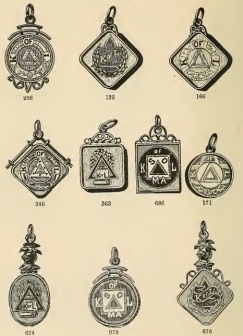 This blog post is decorated with medallions/charms from the Knights of Labor as displayed in F. Irons & Charles A. Russell, Illustrated Catalogue of Solid Gold. Society Emblems, Pins, Buttons and Charms, Providence, Irons & Russell (1895) and a marvellous pin from CNT-FAI that I happend to find on e-bay.
This blog post is decorated with medallions/charms from the Knights of Labor as displayed in F. Irons & Charles A. Russell, Illustrated Catalogue of Solid Gold. Society Emblems, Pins, Buttons and Charms, Providence, Irons & Russell (1895) and a marvellous pin from CNT-FAI that I happend to find on e-bay.

Socialist Phaleristics
 I’m uncertain whether the interest in label pins and their history belongs to phaleristics or not. Perhaps phaleristics proper only study symbolic items granted to someone by someone, and not to label pins that you purchase? Until somebody enlightens me on this scholarly obscurity, I will place socialist pins under the label “socialist phaleristics”.
I’m uncertain whether the interest in label pins and their history belongs to phaleristics or not. Perhaps phaleristics proper only study symbolic items granted to someone by someone, and not to label pins that you purchase? Until somebody enlightens me on this scholarly obscurity, I will place socialist pins under the label “socialist phaleristics”.
Anyhow, the cause for this post is to draw attention to a very neat site about pins form the history of the German Social Democrats that I just stumbled into. Have I look at “Pins zu 150 Jahren SPD-Geschichte”!
 This blog post is decorated with medallions/charms from the Knights of Labor as displayed in F. Irons & Charles A. Russell, Illustrated Catalogue of Solid Gold. Society Emblems, Pins, Buttons and Charms, Providence, Irons & Russell (1895) and a marvellous pin from CNT-FAI that I happend to find on e-bay.
This blog post is decorated with medallions/charms from the Knights of Labor as displayed in F. Irons & Charles A. Russell, Illustrated Catalogue of Solid Gold. Society Emblems, Pins, Buttons and Charms, Providence, Irons & Russell (1895) and a marvellous pin from CNT-FAI that I happend to find on e-bay. 
Dela det här:
Subscribe to:
Comments (Atom)



